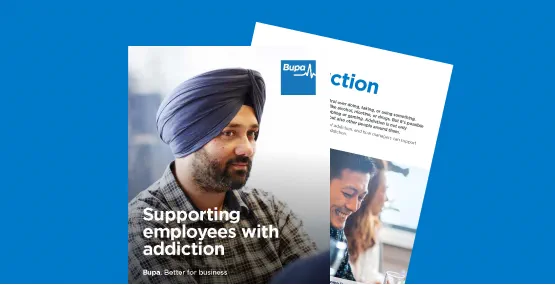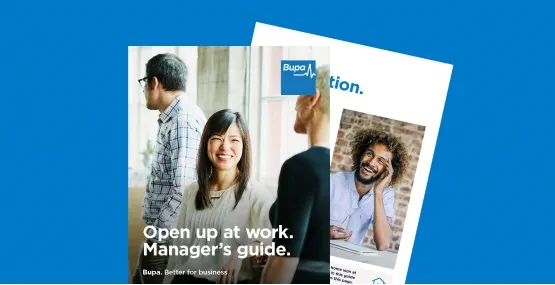Addictive behaviours undermine teams and productivity
As many as one in five working people have difficulty with alcohol or drugs.
They are also at risk of developing a dependency, according to official estimates.1
Alcohol misuse alone costs the UK economy £7.3 billion a year in lost productivity.
The International Labour Organisation estimates that up to 40% of accidents in the workplace involve alcohol.2
42% of employees have gone to work with a hangover, or still under the influence of alcohol.2
When this happened, employees said their performance was 39% less effective than usual.2
Drug usage
The extent of drug dependency in the workplace is not known. Although, Crime Survey data shows that one in 11 adults aged 16 to 59 (9.5%) have taken an addictive, or potentially addictive, Class-A drug in the past year.3 These include heroin, cocaine and ecstasy.4
In the year ending March 2023, 2.3% of adults aged 16 to 59 reported being frequent users of drugs, up from 2.1% in 2020.3
For context, that’s 777,000 people.
The same data shows that around 7.6% of adults have used cannabis.
That number rises to 15.4% for those aged 16 to 24.
Dr Caroline Wood, Head of Behavioural Insights and Research, Bupa Global and UK says,
“This represents a significant risk for any business. Alcohol and drugs impair decision-making and reaction times and increase the risk of both absenteeism and presenteeism.”
Undermines productivity
“Apart from the obvious risk around heavy equipment and accidents, substance misuse also undermines productivity through the output of inferior goods and services.”
Other potential challenges include challenging behaviour towards other employees, increased workloads and stress for other team members and theft to support a drug habit or gambling problem.
Studies reveal some surprising demographics around employment and alcohol or substance misuse.
Occupational hazards
For instance, meta-analysis of 61 studies involving more than 333,000 people found that employees who work more than 55 hours a week are more likely to drink at levels which threaten their health.5
While a report from the British Medical Association (BMA) found that people in managerial and professional positions drink more often than those in routine and manual occupations.6
And it pointed out, “Contrary to popular belief, the majority of people who have an alcohol-use problem are in work.”
High-risk roles
The BMA report identified shift work, travel away from home, remote working and job stress as factors which increase use of alcohol and illicit drugs.6
UK Biobank data from 100,000 adults aged 40 to 69, employed in over 300 different jobs, found that publicans and managers of licensed premises are the heaviest drinkers in both sexes.7
For men, the occupations associated with the highest risk are:
- Industrial cleaners
- Auto electricians
- Bar staff
- Plasterers
- Refuse and salvage workers
- Roofers and roof tilers
- Glaziers and window fitters
- Vehicle body builders and repairers
- Pipe fitters
- Floorers and wall tilers
For women, roles associated with heavy alcohol consumption are:
- Sports and leisure assistants
- Storage and warehouse managers
- Construction trades
- Estate agents and auctioneers
- Driving instructors
- Bar staff
- Restaurant and catering managers
- Other goods handling and storage occupations
- Directors and Chief Executives of major organisations
- Police officers (sergeant and below)
However, Dr Wood says,
“Given their prevalence, substance misuse and addictive behaviours are an issue for all businesses. Problems can remain hidden for many years, unless it’s an industry or role which involves random testing”.
Hidden problem
“People experiencing addiction can be very adept at masking their behaviour. They can hold down demanding jobs and maintain full social lives. They can even hide their difficulties from their partners and close family.
“These high-functioning individuals are often in denial about the extent of their dependency. They may use their ability to perform as a defence if anyone suggests there is a problem.
“Some experts prefer the term ‘currently functioning addict’. Because sooner or later, there will be a breaking point.
“This could be because the addiction has escalated to the point that it is impacting their performance or health. Sometimes it’s because the family, colleagues and friends they have relied on withdraw their support. Or, because they insist that dependency issues are addressed.”
Avoiding a crisis
Inaction is not an option. Employers have a statutory duty, under the Health and Safety at Work Act, to ensure the health, safety and welfare of employees.
And the Management of Health and Safety at Work Regulations require employers to conduct regular risk assessments. These should include checks on the use of alcohol and drugs, if there is any sign of a problem.
Dr Wood concludes,
“Employers must have systems in place to identify team members who may be struggling and offer support before there is a crisis.”
Benefits of early intervention
“The business case for early intervention is undeniable. It protects productivity, the organisation’s reputation and avoids potential HR issues involving the individual with dependency issues as well as their colleagues.
“Providing effective support and having policies in place which promote positive interventions will minimise the damage for both the individual and the organisation.”
Resources from the Workplace Health and Wellbeing Academy

Managers guide: Addiction

Managers guide: Mental health in the workplace
1 European Monitoring centre for Drugs and Drug Addicition, March 2022.
2 Institute of Alcohol Studies (PDF, 0.6MB), October 2022.
3 Office for National Statistics, Drug misuse in England and Wales: year ending March 2023.
4 Gov UK, Drugs penalties.
5 The BMJ, Long working hours and alcohol use: systematic review and meta-analysis of published studies and unpublished individual participant data, January 2015, DOI: 10.1136/bmj.g7772
6 British Medical Association (PDF, 0.5MB), Alcohol, drugs and the workplace – The role of medical professionals, July 2016.
7 BMC Public Health, Associations between occupation and heavy alcohol consumption in UK adults aged 40–69 years: a cross-sectional study using the UK Biobank, 2021, DOI:0.1186/s12889-021-10208-x


